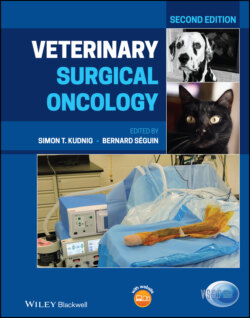Читать книгу Veterinary Surgical Oncology - Группа авторов - Страница 112
Surgery Perioperative Management
ОглавлениеPerioperative surgical complications may be encountered related to the release of vasoactive substances from mast cell granules secondary to tumor manipulation. MCTs should not be manipulated extensively during the (pre)operative period to avoid the risk of a degranulation reaction.
Preoperative treatment with H1 blocker (diphenhydramine) and H2 blockers (cimetidine, ranitidine, or famotidine) and corticosteroids has historically been recommended in dogs with cutaneous MCTs that will be surgically manipulated, including biopsy, and those that show evidence of degranulation, melena, or hemoptysis associated with gastrointestinal ulcerations secondary to histamine release. It has been suggested that hypotension during surgery may be caused by mast cell degranulation and histamine release. A recent study, however, showed that administration of diphenhydramine did not provide any clear benefit in preventing hypotension in dogs undergoing MCT removal (Sanchez et al. 2017).
The use of neoadjuvant corticosteroid (prednisone) treatment may facilitate resection of MCT when adequate surgical margins cannot be confidently expected because of location, size, or both (Stanclift and Gilson 2008; Dobson et al. 2004). Mean reduction in MCT volume was 80.6% in 70% of cases treated with neoadjuvant prednisolone. Reduction in tumor size may be related to the anti‐inflammatory effect of prednisolone, reducing tumor‐related inflammation and edema secondary to tumor cytokine release. There was no difference in response rate between a high dose (2.2 mg/kg) and a low dose (1.0 mg/kg) prednisone protocol. Using neoadjuvant prednisone did not increase the risk of incomplete margins or local recurrence in one study (Saunders 2020).
